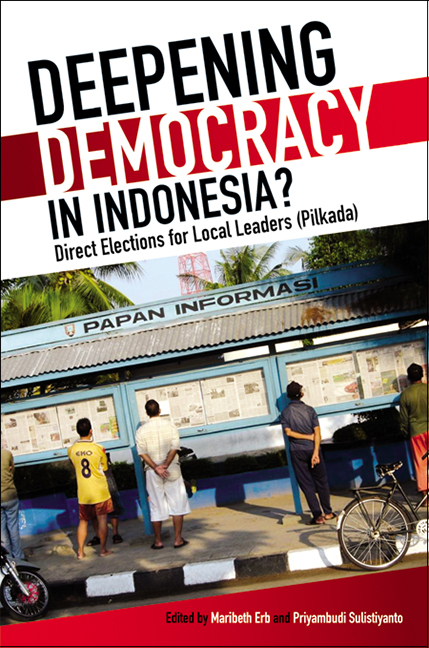Book contents
- Frontmatter
- Dedication
- Contents
- List of Tables
- List of Figures
- Contributors
- Acknowledgements
- Glossary
- 1 Indonesia and the Quest for “Democracy”
- 2 Pilkada Langsung: The First Step on the Long Road to a Dualistic Provincial and District Government
- Part I Political Parties, Politician Elites and the Voters
- 3 Political Parties in Pilkada: Some Problems for Democratic Consolidation
- 4 Batam's 2006 Mayoral Election: Weakened Political Parties and Intensified Power Struggle in Local Indonesia
- 5 The Rising Importance of Personal Networks in Indonesian Local Politics: An Analysis of District Government Head Elections in South Sulawesi in 2005
- 6 Pilkada, Money Politics and the Dangers of “Informal Governance” Practices
- 7 Electing District Heads in Indonesia: Democratic Deepening or Elite Entrenchment?
- 8 Gender and Reform in Indonesian Politics: The Case of a Javanese Woman Bupati
- 9 Pilkada in Bantul District: Incumbent, Populism and the Decline of Royal Power
- Part II Media and Campaigns: Comparing Local and National Elections
- Part III Conflict, Ethnicity, and Political Divisions
- Index
5 - The Rising Importance of Personal Networks in Indonesian Local Politics: An Analysis of District Government Head Elections in South Sulawesi in 2005
from Part I - Political Parties, Politician Elites and the Voters
Published online by Cambridge University Press: 21 October 2015
- Frontmatter
- Dedication
- Contents
- List of Tables
- List of Figures
- Contributors
- Acknowledgements
- Glossary
- 1 Indonesia and the Quest for “Democracy”
- 2 Pilkada Langsung: The First Step on the Long Road to a Dualistic Provincial and District Government
- Part I Political Parties, Politician Elites and the Voters
- 3 Political Parties in Pilkada: Some Problems for Democratic Consolidation
- 4 Batam's 2006 Mayoral Election: Weakened Political Parties and Intensified Power Struggle in Local Indonesia
- 5 The Rising Importance of Personal Networks in Indonesian Local Politics: An Analysis of District Government Head Elections in South Sulawesi in 2005
- 6 Pilkada, Money Politics and the Dangers of “Informal Governance” Practices
- 7 Electing District Heads in Indonesia: Democratic Deepening or Elite Entrenchment?
- 8 Gender and Reform in Indonesian Politics: The Case of a Javanese Woman Bupati
- 9 Pilkada in Bantul District: Incumbent, Populism and the Decline of Royal Power
- Part II Media and Campaigns: Comparing Local and National Elections
- Part III Conflict, Ethnicity, and Political Divisions
- Index
Summary
In recent years, the initial enthusiasm for decentralization of political authority to the district level and its “democratizing” impact on entrenched political elites in Indonesia has been replaced by increasingly gloomy evaluations of the country's devolution process. A growing number of both academic and donor accounts now tell the story of how the mode of state power that was established under the authoritarian government of Soeharto continues despite the demise of the New Order regime and the institutional reforms that followed. In other words, despite the introduction of free and fair elections and the devolution of political authority, “old elites” maintained their strategic administrative and political positions at the national, provincial, and local levels (Hadiz and Robison 2004, p. 29). This chapter argues that while “old elites” indeed remain in power, the new institutional environment has reshuffled the cards for political elites. Personal networks at the local level have become more important in winning elections, while large party machines have become a less decisive factor in shaping election outcomes. A more pluralist view than the one stressing continuity above all is thus needed.
INSTITUTIONAL CHANGES IN POST-NEW ORDER INDONESIA
Indonesian politics have been shaped by two main developments since 1998. Firstly, there has been a more democratic spirit in government after forty years of autocratic rule. Secondly, starting with Law No. 22/1999 and Law No. 25/1999, Indonesia embarked on a far-reaching decentralization process of its political institutions that shifted most of the political power to the districts (kabupaten) and municipalities (kotamadya), leaving the centre — and even more so the provinces — with fewer political and economic responsibilities.
Even after the re-centralization attempts of Law No. 32/2004, local governments are still much stronger than prior to 1998. The ambiguous formulation of Law No. 32/2004 resulted in an unclear distribution of responsibilities between levels of government (Atje and Gaduh 2004, p. 9; Jacobsen 2004, p. 384; Kaiser and Hofman 2002, p. 5). At the same time, Law No. 32/2004 drastically cut the oversight power of the local assembly, the Dewan Perwakilan Rakyat Daerah (DPRD), over the local executive. In short, while attempts to reinstate vertical accountability did not successfully materialize, horizontal accountability between the legislative and the executive at the kabupaten level was crippled.
- Type
- Chapter
- Information
- Deepening Democracy in Indonesia?Direct Elections for Local Leaders (Pilkada), pp. 101 - 124Publisher: ISEAS–Yusof Ishak InstitutePrint publication year: 2009

